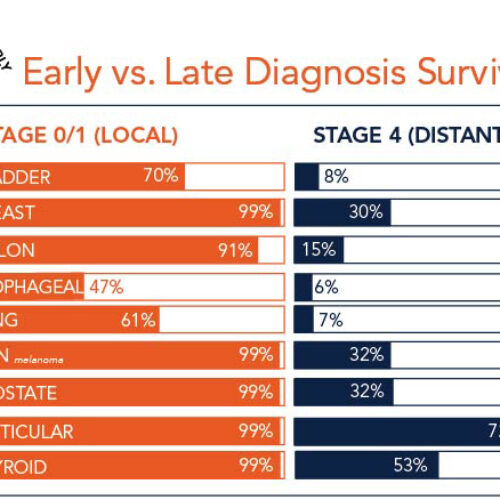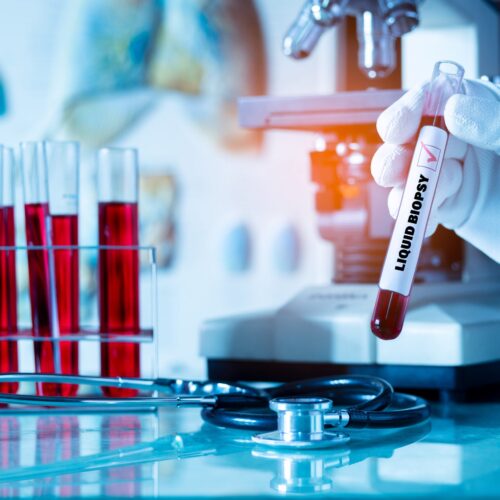
Knowing Your Great Is Determining What’s Normal for You
Create a baseline of what is normal for you. When you take time to establish your baseline, you’ll be the first to recognize health changes.
If you routinely check in with your body, and benchmark “your great,” you are more likely to notice health changes.
Here are 15 symptoms women often ignore:
- Abnormal periods or pelvic pain. Abnormal periods are not uncommon. Your period can be impacted by many factors such as pregnancy, menopause, obesity, thyroid conditions, endometriosis, benign ovarian cysts, or even stress. However, when you begin to have sudden, significant changes in your cycle, it is time to see a doctor. Changes such as having significantly heavier periods month after month should be looked into. Pelvic pain and irregular bleeding can be a sign of cervical, ovarian, or other gynecological cancers.
- Bloating. Bloating after eating a heavy meal or during your cycle? That’s normal. Bloating every day with no known cause? Not so much. Bloating, or consistently feeling constipated, can be a sign of ovarian or uterine cancer. Rich Wender, MD, chief cancer control officer for the American Cancer Society, says, “If it’s been a few weeks and isn’t getting better, that’s a change… that’s not you. Ask a doctor to take a closer look.” If you’re popping a Gas-X everyday, it’s time to see a doctor.
- Blood in the stool. Seeing blood in your stool can be scary. However, many people are quick to blame hemorrhoids or constipation. While hemorrhoids are extremely common (roughly 75 percent of the population will get them at some point in their lives), blood in the stool should never be dismissed without seeking medical attention. Blood in a bowel movement is never normal and should always be checked out. Blood in the stool could signal serious problems such as colon cancer, which is becoming increasingly common in people under the age of 50.
- Breast dimpling, discoloration or other changes. Women are very aware that lumps and bumps in the breast can be a sign of breast cancer. However, beast dimpling is a lesser-known symptom that should be taken seriously. Other breast cancer symptoms include swelling, tenderness, skin discoloration, and even nipple inversion. It’s important to remember that if you have these symptoms it does not mean you definitely have cancer. However it’s important not to overlook these symptoms just because they do not seem important. It is always better to be safe than sorry when it comes to your health.
- Chronic coughing. Is it the common cold, allergies, the flu or something more? Everyone gets sick from time to time. But if you develop a cough that last two weeks or more and do not have any other typical cold symptoms, it might be a sign of lung cancer or leukemia. Coughing up blood is also a red flag that something needs immediate attention.
- Chronic headaches. If you have no history of migraines and typically do not get headaches, a sudden onset of chronic headaches could signal that something is wrong. If you have already been diagnosed with migraines and your treatment is working, there likely isn’t any reason to be concerned. However, if you have never had a problem with headaches and suddenly find yourself desperate for a dark, quiet room, this health change should be discussed with your doctor.
- Difficulty swallowing. Difficulty swallowing can be caused by a simple sore throat, but if it’s persistent it may be a sign of throat, stomach, or lung cancer. Always use the two-week rule—if it lasts for more than two weeks, it’s time to see a doctor. Even if the difficulty is being caused by a non-cancerous infection, early detection will help you diagnose it and begin treatment so you will feel better, sooner.
- Excessive bruising. If you’re clumsy, it’s probably not too much of a surprise, or concern, if you find a few random bruises here or there. But if you start to notice bruises popping up all the time, especially in bizarre places such as your hands or fingers, it could be something serious. Excessive bruising can be a sign of anemia, or more seriously, leukemia.
- Frequent fevers or infection. Do you find yourself taking crazy amounts of pain relievers or fever reducers? Besides likely doing some serious damage to your liver, you are not helping your body by treating something without determining the cause first. Frequent fevers and infections can be an early sign of leukemia or lymphoma, which weaken the immune system and make you more susceptible to illness. If you begin to have seemingly random illnesses one after another, bring up your concerns with a doctor.
- Noticeable skin changes. Skin cancer is the most common form of cancer in the United States. By performing routine self-exams and reporting any changes to your doctor, you can detect cancer early and save your own life.
- Persistent fatigue. You should see a doctor if you find yourself feeling absolutely exhausted every day, even after a good night’s sleep, for more than two weeks. There are many things that can cause you to feel tired. Some of the most common medical causes of fatigue are anemia and depression. However, cancers such as leukemia and lymphoma often present as a change in energy level. Try to remember how you feel when you feel great, this way you will be able to easily recognize changes in your health.
- Postmenopausal bleeding. If you have gone through menopause, meaning that you have not had a period for one year, a sudden onset of vaginal bleeding should always be brought up to a doctor. Postmenopausal bleeding can occur as a result of hormone replacement therapy, infections such as a UTI, or noncancerous growths called polyps. However, postmenopausal bleeding can also be a sign of serious medical problems such as cervical or uterine cancer. Do not ignore postmenopausal bleeding. Seek help quickly to get a diagnosis and treatment plan, no matter what the cause.
- Sores or pain in the mouth. If you get a cold sore from time to time that heals after treatment, there is nothing to worry about. The concern comes when you notice a sore that doesn’t heal, or any pain in the mouth that sticks around for more than two weeks. It’s also important to pay attention to swelling, numbness, or pain in the jaw. It’s also important to perform an oral self-exam each month, especially if you use tobacco products, are a heavy drinker, or have a history of oral cancer in your family.
- Stomach pain or nausea. Upset stomachs are so common it would be irresponsible to claim that they mean you have cancer. More often than not, you probably ate something your body didn’t agree with, are experiencing more stress than usual, or have a gastrointestinal disorder such as IBS. However, if you notice sudden and persistent stomach cramps that last more than two weeks, or are experiencing nausea that just won’t go away, it’s time to see a doctor. Stomach pain and nausea can be signs of leukemia or esophageal, liver, pancreatic, or colorectal cancer.
- Unexplained weight loss. Weight loss is often overlooked by women because they see it as a good change, not a concerning one. Both sexes are more likely to see a doctor for weight gain than they are for weight loss. However, weight loss, as well as sudden or unusual changes in appetite, can be a symptom of cancer. Esophageal, pancreatic, liver, and colon cancer can all cause weight loss, as well as leukemia or lymphoma.






